- Home
- T.A. Barron
The Lost Years
The Lost Years Read online
Try, you coward!
a voice within me cried. You must try!
Yet, just as urgently, another voice answered: Never again! Last time you destroyed your eyes. This time you will destroy your very soul. Never again!
“Show me!” commanded the goblin. Even through the thickening mist, I saw his muscles tighten. Raising his sword, he aimed the blade at Rhia’s neck.
Still I hesitated.
Just then a strange wind, wilder by the second, shook the branches of the old elm in the center of the grove. Its creaking rose to a scream. As the goblin looked up, the tree snapped free of its roots and toppled over. He had only enough time to howl in agony as the tree crashed down on top of him.
I reached for the Galator, which had dropped to the ground. I slung the leather cord over my neck. With my other hand, I grabbed the fallen goblin’s sword and started slashing at another member of the band. The goblin, far stronger than I, quickly backed me against the trunk of the downed tree.
The goblin reared back to strike me down. Suddenly, he froze. A look of sheer horror came over his face—horror that I had seen only once before, in Dinatius when the flames swallowed him.
I whirled around. Then I, too, froze. The sword fell from my hand. For out of the swirling mist came a gargantuan white spider, her jaws slavering.
PUFFIN BOOKS
Published by the Penguin Group
Penguin Young Readers Group, 345 Hudson Street, New York, New York 10014, U.S.A.
Penguin Group (Canada), 90 Eglinton Avenue East, Suite 700, Toronto, Ontario, Canada M4P 2Y3
(a division of Pearson Penguin Canada Inc.)
Penguin Books Ltd, 80 Strand, London WC2R 0RL, England
Penguin Ireland, 25 St Stephen’s Green, Dublin 2, Ireland (a division of Penguin Books Ltd)
Penguin Group (Australia), 250 Camberwell Road, Camberwell, Victoria 3124, Australia
(a division of Pearson Australia Group Pty Ltd)
Penguin Books India Pvt Ltd, 11 Community Centre, Panchsheel Park, New Delhi - 110 017, India
Penguin Group (NZ), 67 Apollo Drive, Rosedale, Auckland 0632, New Zealand
(a division of Pearson New Zealand Ltd.)
Penguin Books (South Africa) (Pty) Ltd, 24 Sturdee Avenue,
Rosebank, Johannesburg 2196, South Africa
Registered Offices: Penguin Books Ltd, 80 Strand, London WC2R 0RL, England
First published in the United States of America as The Lost Years of Merlin by Philomel Books,
a division of Penguin Young Readers Group, 1996
Paper-over-board edition, 2007
Published as The Lost Years by Puffin Books,
a division of Penguin Young Readers Group, 2011
Text copyright © Thomas A. Barron, 1996
Map illustration copyright © Ian Schoenherr, 1996
All rights reserved
Paper-over-board edition, 2007
THE LIBRARY OF CONGRESS HAS CATALOGED THE PHILOMEL BOOKS EDITION AS FOLLOWS:
Barron, T. A. The lost years of Merlin / T. A. Barron
p. cm.
Summary: A young boy who has no identity nor memory of his past washes ashore on the coast of Wales and finds his true name after a series of fantastic adventures.
ISBN : 978-0-399-25020-0 (hc)
[1. Merlin (Legendary character)—Juvenile Fiction. [1. Merlin (Legendary character)—Fiction.
2. Wizards—Fiction. 3. Fantasy.]
I. Title
PZ7.B27567 Lo
1996 [Fic]—dc20 96-33920
Puffin Books ISBN 978-0-14-241889-5
Design by Gunta Alexander
Text set in Galliard
Printed in the United States of America
Except in the United States of America, this book is sold subject to the condition that it shall not, by way of trade or otherwise, be lent, re-sold, hired out , or otherwise circulated without the publisher’s prior consent in any form of binding or cover other than that in which it is published and without a similar condition including this condition being imposed on the subsequent purchaser.
The publisher does not have any control over and does not assume any responsibility for author or third-party Web sites or their content.
This book is dedicated to
Patricia Lee Gauch
loyal friend, passionate writer, demanding editor
with special appreciation to
Ben
age four, who sees and soars like a hawk
AUTHOR’S NOTE
I don’t know much about wizards, but I have learned this much: They are full of surprises.
As I finished writing The Merlin Effect, a novel that follows a single strand of Arthurian legend from ancient Druid times almost to the dawn of the twenty-first century, I realized that the strand had bound me up so tightly that I could not escape. As I tugged on it, the strand tugged back. As I unraveled it, the strand entangled me more completely.
The strand was Merlin himself. He is a mysterious and captivating fellow, this wizard who can live backward in time, who dares to defy even the Threefold Death, and who can seek the Holy Grail while still speaking with the spirits of rivers and trees. I realized that I wanted to get to know him better.
Modern scholars have argued that the myth of Merlin may have sprung from an actual historical figure, a Druid prophet who lived somewhere in Wales in the sixth century A.D. But that is a matter for historians to debate. For whether or not Merlin was ever real in the realm of history, he is certainly real in the realm of imagination. There he has long lived, and there he continues to thrive. He even accepts visitors on occasion. And since I wanted to write a work of imagination, not history, Merlin’s door was wide open.
So before I could even begin to protest, Merlin made his own plans for me. My other books and projects had to wait. It was time to explore another aspect of his legend, one deeply personal to the wizard himself. I suspected that, like most things in life, the more I learned about Merlin, the less I would really know. And, to be sure, I was well aware from the outset that making even a small contribution to such a marvelous body of myth would pose a daunting challenge. But curiosity can be a powerful motivator. And Merlin was insistent.
Then came the wizard’s first surprise. As I immersed myself in the traditional tales about Merlin, I found an unexplained gap in the lore. Merlin’s youth—the crucial, formative time when he most likely discovered his own shadowy origins, his own identity, and his own powers—was only fleetingly mentioned, if it was mentioned at all. Where he first tasted sorrow, where he first knew joy, where he first gained a particle or two of wisdom, remained unexplored.
Most of the traditional tales follow the same approach as Thomas Malory and ignore Merlin’s early life entirely. A few stories speak of his birth, his tormented mother, his unknown father, and his precocious infancy. (In one account, he speaks fluently in his mother’s defense when only one year old.) Then we hear nothing more of him—until, when considerably older, he is found explaining the secret of the fighting dragons to the treacherous King Vortigern. In between lies a gap of several years. Perhaps, as some have supposed, he wandered alone in the woods during those years lost from legend. Or perhaps, just perhaps . . . he traveled somewhere else.
This gap in Merlin’s early life contrasts starkly with the volumes and volumes of material about his later years. As an adult, he assumes many (sometimes contradictory) forms, being variously described as prophet, magician, Madman of the Forest, trickster, priest, seer, and bard. He appears in some of the earliest myths of Celtic Britain, some of them so ancient that their sources were already obscure when the great Welsh epics of the Mabinogion were first set down a thousand years ago. In Spenser’s Faerie Queene and in Ariosto’s Orlando Furioso, Merlin th
e wizard is present. He counsels the young king in Malory’s Morte d’Arthur, assembles Stonehenge in Robert de Boron’s twelfth-century poem Merlin, delivers many prophecies in Geoffrey of Monmouth’s Historia Regnum Brittaniae.
More recently, writers as diverse as Shakespeare, Tennyson, Thomas Hardy, T. H. White, Mary Stewart, C. S. Lewis, Nikolai Tolstoy, and John Steinbeck have spent time with this fascinating figure, as have many others in many lands. Yet, with rare exceptions such as Mary Stewart, few have dealt at all with Merlin’s youth.
And so the early years of Merlin remain strangely mysterious. We are left wondering about his early struggles, fears, and aspirations. What were his deepest dreams? His passions? How did he discover his own unusual talents? How did he deal with tragedy and loss? How did he come to know, perhaps even to accept, his own dark side? How did he first encounter the spiritual works of the Druids—and, for that matter, the ancient Greeks? How did he reconcile his own yearning for power and his horror at its abuses? In sum, how did he become the wizard and mentor to King Arthur whom we celebrate still today?
Questions such as these are not answered by the traditional lore. Nor do the words attributed to Merlin himself shed much light. Indeed, one gets the impression that he was determined to avoid talking about his own past. A reader of the traditional lore could fairly easily picture Merlin as an old man, seated beside the boy Arthur, musing distractedly about the “lost years” of his youth. Yet one can only speculate whether he might have been remarking on the brevity of life, or perhaps referring to a missing chapter from his own past.
My own view is that, during Merlin’s lost years, he not only disappeared from the world of story and song. Rather, I believe that Merlin himself disappeared—from the world as we know it.
This tale, spanning a few volumes, will attempt to bridge the gap. The story begins when a young boy, without any name and without any memory of his past, washes ashore on the coast of Wales. It concludes when that same boy, having gained and lost a great deal, is ready to step into a central role in Arthurian legend.
In between, much happens. He discovers his second sight, but pays dearly for the privilege. He begins to speak with animals, trees, and rivers. He finds the original Stonehenge, far older than the circle of stones that tradition credits him with constructing on England’s Salisbury Plain. First, however, he must learn the meaning of Stonehenge’s Druid name, Dance of the Giants. He explores his first crystal cave. He voyages to the lost Island of Fincayra (spelled Fianchuivé in the Gaelic), known in Celtic myth as an island beneath the waves, a bridge between the Earth of human beings and the Otherworld of spiritual beings. He encounters some figures whose names are familiar in ancient lore, including the great Dagda, the evil Rhita Gawr, the tragic Elen, the mysterious Domnu, the wise Cairpré, and the vital Rhia. He also encounters others not so familiar, such as Shim, Stangmar, T’eilean and Garlatha, and the Grand Elusa. He learns that true sight requires more than eyes; that true wisdom unites qualities often separated, like faith and doubt, female and male, light and dark; that true love mingles joy with grief. And, most important of all, he gains the name Merlin.
Some words of thanks are necessary: to Currie, my wife and best friend, for guarding so well my solitude; to our pandemonious children Denali, Brooks, Ben, Ross, and Larkin, for their abundant sense of humor and sense of wonder; to Patricia Lee Gauch, for her unwavering faith in the power of a story to be true; to Victoria Acord and Patricia Waneka, for their invaluable assistance; to Cynthia Kreuz-Uhr, for her understanding of the interwoven sources of myth; to those who have encouraged me along the way, especially Madeleine L’Engle, Dorothy Markinko, and M. Jerry Weiss; to all the bards and poets and storytellers and scholars who have contributed over many centuries to the tales of Merlin; and, of course, to the elusive wizard himself.
Come with me, then, as Merlin reveals to us the story of his lost years. In this journey, you are the witness, I am the scribe, and Merlin himself is our guide. But let us beware, for a wizard, as we know, is full of surprises.
T. A. B.
He that made with his hand
Wynd and water, wode the land;
Geve heom alle good ending,
That wolon listne this talkyng,
And y schal telle, yow byfore,
How Merlyn was geten and bore
And of his wisdom also
And othre happes mony mo
Sum whyle byfeol in Engeolnde.
—From the thirteenth-century ballad
OF AUTHOUR AND OF MERLIN
PROLOGUE
If I close my eyes, and breathe to the rolling rhythm of the sea, I can still remember that long ago day. Harsh, cold, and lifeless it was, as empty of promise as my lungs were empty of air.
Since that day, I have seen many others, more than I have the strength left to count. Yet that day glows as bright as the Galator itself, as bright as the day I found my own name, or the day I first cradled a baby who bore the name Arthur. Perhaps I remember it so clearly because the pain, like a scar on my soul, will not disappear. Or because it marked the ending of so much. Or, perhaps, because it marked a beginning as well as an ending: the beginning of my lost years.
A dark wave rose on the rolling sea, and from it lifted a hand.
As the wave surged higher, reaching toward sky as smoky gray as itself, the hand reached higher as well. A bracelet of foam swirled around the wrist, while desperate fingers groped for something they could not find. It was the hand of someone small. It was the hand of someone weak, too weak to fight any longer.
It was the hand of a boy.
With a deep sucking sound, the wave began to crest, tilting steadily toward the shore. For an instant it paused, hovering between ocean and land, between the brooding Atlantic and the perilous, rock-bound coast of Wales, known in those days as Gwynedd. Then the sucking swelled into a crashing roar as the wave toppled over, hurling the boy’s limp body onto the black rocks.
His head smacked against a stone, so violently that his skull would surely have split open were it not for the thick mat of hair that covered it. He lay completely still, except when the whoosh of air from the next wave tousled his locks, black beneath the stains of blood.
A shabby seagull, seeing his motionless form, hopped over the jumble of rocks for a closer look. Bending its beak toward the boy’s face, it tried to pull a strand of sea kelp that was wrapped around his ear. The bird tugged and twisted, squawking angrily.
At last the kelp broke free. Triumphantly, the bird jumped down to one of the boy’s bare arms. Beneath the shreds of a brown tunic still clinging to him, he seemed small, even for a boy of seven years. Yet something about his face—the shape of his brow, perhaps, or the lines around his eyes—seemed far older.
At that instant, he coughed, vomited seawater, and coughed again. With a screech, the gull dropped the kelp and fluttered off to a stony perch.
The boy remained motionless for a moment. All he could taste was sand, slime, and vomit. All he could feel was the painful throbbing of his head, and the rocks jabbing into his shoulders. Then came another cough, another gush of seawater. A halting, labored breath. Then a second breath, and a third. Slowly, his slender hand clenched into a fist.
Waves surged and subsided, surged and subsided. For a long while, the small candle flame of life in him wavered at the edge of darkness. Beneath the throbbing, his mind seemed strangely empty. Almost as if he had lost a piece of his very self. Or as if a kind of wall had been erected, cutting him off from a portion of himself, leaving nothing but a lingering sense of fear.
His breathing slowed. His fist relaxed. He gasped, as if to cough again, but instead fell still.
Cautiously, the seagull edged closer.
Then, from whatever quarter, a thin thread of energy began to move through his body. Something inside him was not yet ready to die. He stirred again, breathed again.
The gull froze.
He opened his eyes. Shivering with cold, he rolled to his side. Fee
ling the rough sand in his mouth, he tried to spit, but succeeded only in making himself gag from the rancid taste of kelp and brine.
With effort, he raised an arm and wiped his mouth with the tatters of his tunic. Then he winced, feeling the raw lump on the back of his head. Willing himself to sit up, he braced his elbow against a rock and pushed himself upright.
He sat there, listening to the grinding and splashing sea. Beyond the ceaseless pulsing of the waves, beyond the pounding inside his head, he thought for an instant that he could hear something else—a voice, perhaps. A voice from some other time, some other place, though he could not remember where.
With a sudden jolt, he realized that he could not remember anything. Where he had come from. His mother. His father. His name. His own name. Hard as he tried, he could not remember. His own name.
“Who am I?”
Hearing his cry, the gull squawked and took flight.
Catching sight of his reflection in a pool of water, he paused to look. A strange face, belonging to a boy he did not know, peered back at him. His eyes, like his hair, were as black as coal, with scattered flecks of gold. His ears, which were almost triangular and pointed at the top, seemed oddly large for the rest of his face. Likewise, his brow rose high above his eyes. Yet his nose looked narrow and slight, more a beak than a nose. Altogether, his face did not seem to belong to itself.
He mustered his strength and rose to his feet. Head swirling, he braced himself against a pinnacle of rock until the dizziness calmed.
His eyes roamed over the desolate coastline. Rocks upon rocks lay scattered everywhere, making a harsh black barrier to the sea. The rocks parted in only one place—and then only grudgingly—around the roots of an ancient oak tree. Its gray bark peeling, the old oak faced the ocean with the stance of centuries. There was a deep hollow in its trunk, gouged out by fire ages ago. Age warped its every branch, twisting some into knots. Yet it continued to stand, roots anchored, immutable against storm and sea. Behind the oak stood a dark grove of younger trees, and behind them, high cliffs loomed even darker.

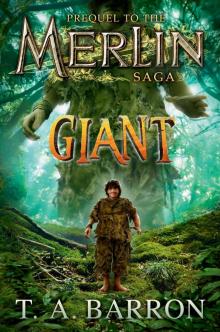 Giant
Giant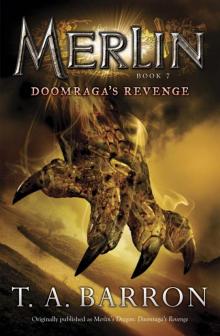 Doomraga's Revenge
Doomraga's Revenge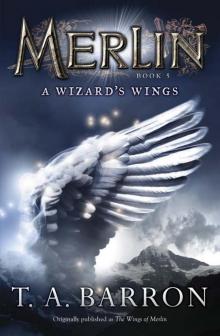 A Wizard's Wings
A Wizard's Wings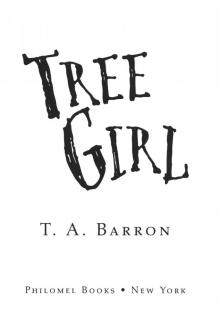 Tree Girl
Tree Girl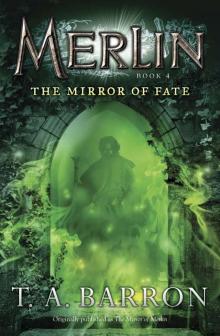 The Mirror of Fate
The Mirror of Fate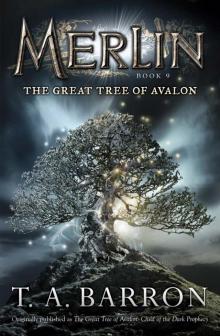 The Great Tree of Avalon
The Great Tree of Avalon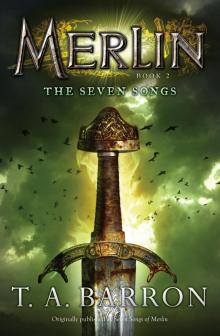 The Seven Songs
The Seven Songs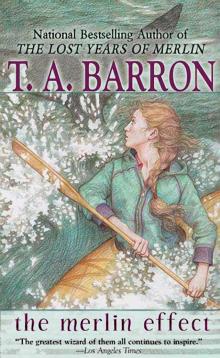 The Merlin Effect
The Merlin Effect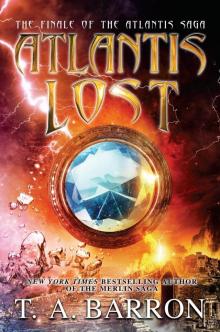 Atlantis Lost
Atlantis Lost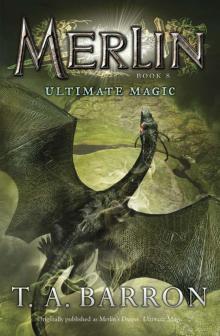 Ultimate Magic
Ultimate Magic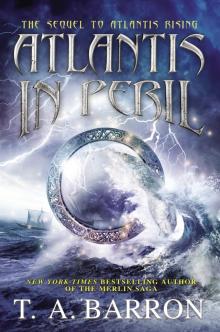 Atlantis in Peril
Atlantis in Peril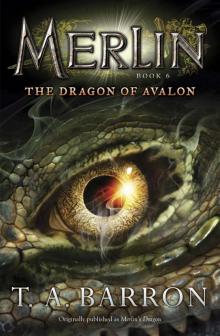 The Dragon of Avalon
The Dragon of Avalon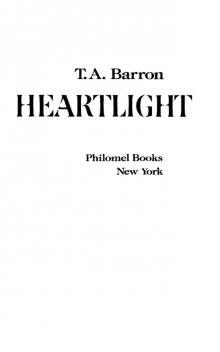 Heartlight
Heartlight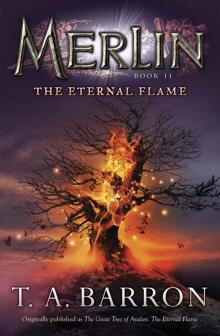 The Eternal Flame
The Eternal Flame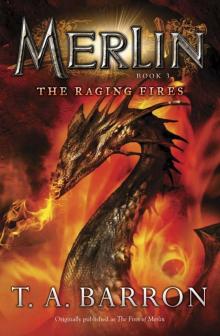 The Raging Fires
The Raging Fires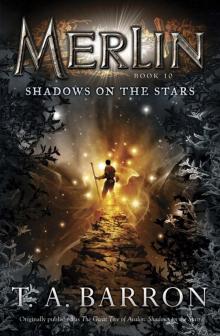 Shadows on the Stars
Shadows on the Stars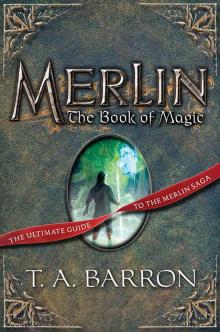 Merlin: The Book of Magic
Merlin: The Book of Magic The Lost Years
The Lost Years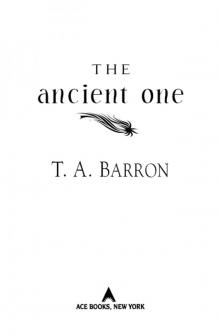 The Ancient One
The Ancient One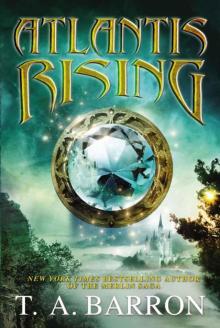 Atlantis Rising
Atlantis Rising